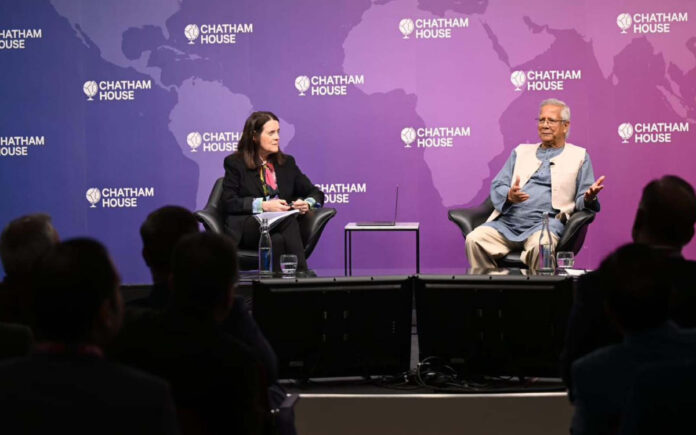London: Bangladesh’s interim government chief, Muhammad Yunus, has claimed that Indian Prime Minister Narendra Modi ignored his plea to prevent Sheikh Hasina, the former Bangladeshi prime minister, from making political statements while in India.
Speaking at a session hosted by Chatham House in London, Yunus reiterated his government’s resolve to pursue Hasina’s extradition to face trial in Bangladesh. The country’s International Crimes Tribunal recently indicted Hasina for allegedly ordering a police crackdown on protestors during the final phase of her government last year.
Hasina has been residing in India since fleeing Bangladesh in August, following her government’s collapse amid mass student-led protests. Despite a formal extradition request sent by Dhaka in December, New Delhi has so far not responded. Indian officials also made no immediate comment on Yunus’s remarks during the event.
Yunus recounted a conversation with Modi on the sidelines of a BIMSTEC summit held in Bangkok in April, where he directly addressed concerns about Hasina’s continued influence over political narratives in Bangladesh from Indian territory.
“When I had a chance to talk to Prime Minister Modi, I simply said you want to host her, I cannot force you to abandon that policy. But please help us in making sure she doesn’t speak to Bangladeshi people the way she is doing,” Yunus said.
He described the impact of Hasina’s announcements, which are reportedly made at scheduled times, as deeply unsettling for the Bangladeshi public.
“She announces on such and such day and at such and such hour she will speak and the whole of Bangladesh gets very angry,” he added.
When asked by the moderator whether India had acted on his request, Yunus said:
“No. Modi’s answer [and] I quote, he said it is the social media, we cannot control it. What can you say? This is an explosive situation, you can’t just walk away by saying this is social media. This is what is still going on.”
Yunus reaffirmed his administration’s intent to push forward with the legal route for Hasina’s extradition.
“This will continue…another stage has come, now there is a case. The International Crimes Tribunal has started the trial process, they sent notices to Hasina for all the crimes she has committed…So, they have to respond to the notices,” he said.
“This is a legal notice, so we have to go to the Interpol and all the other things that happen through that. This is the process that we are following, we want it to be very legal, very proper.”
Also Read | Taiwan Cyber Unit Defies China’s Arrest Bounty, Rejects Beijing’s Jurisdiction
He also criticized what he termed as “fake news” in Indian media, suggesting that misleading narratives were harming bilateral relations.
“We want to build the best of relationships with India, it’s our neighbour. We don’t want to have any kind of basic problem with them. But somehow things go wrong every time because of all the fake news coming from the Indian press and many people say it has connections with policy-makers at the top and so on,” Yunus said.
Also Read | Rare Earth Rush: Chinese-Backed Militias Open New Mines in Myanmar
“This is what makes Bangladesh very jittery, very angry. We try to get over this anger but…the whole barrage of things keep happening in cyberspace, we can’t get away from that.”
Relations between India and Bangladesh have sharply deteriorated since the caretaker government led by Yunus took office. India has repeatedly criticized the interim regime for allegedly failing to protect religious minorities and for enabling radical elements. Yunus, however, has dismissed those concerns as “exaggerated”.



